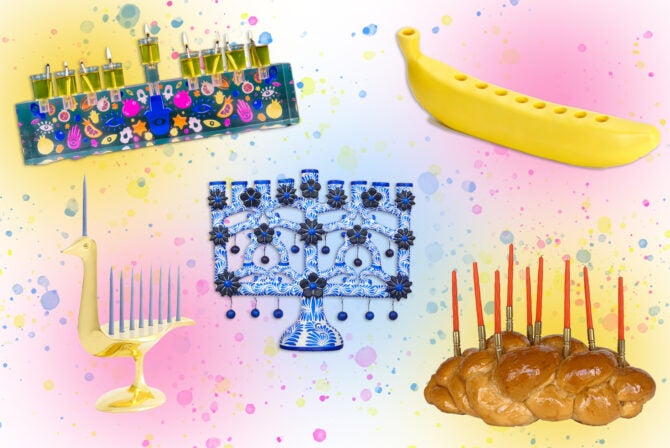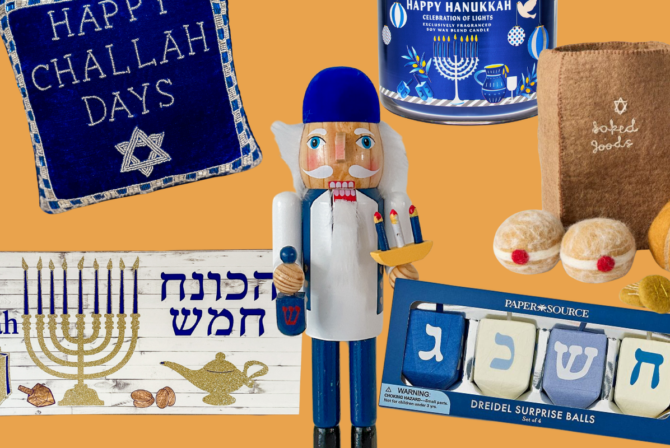My grandma, Gramma Anna as we called her, was born in Dairyland a child of the Depression, and raised her family on the corner of Main St. in Middletown, NY. My Bubbe, Sala, was born in Lodz, Poland, spent most of her childhood in Nazi death camps, and moved her family from Germany to upstate New York when she was 21 years old. Both women knew how to make kasha varnishkes and other Jewish staples, both could knit and sew, and both made sure we, their grandchildren, knew how much we were loved.
But these women couldn’t have been more different.
Gramma signed our birthday cards in perfect cursive, “with love,” and Bubbe drew zany pictures of flowers and x’s (kisses) and sunshine all around the words “kisses kisses kisses” and “love you mamale,” words she’d spelled phonetically. Gramma was quiet and contented herself during visits to our house by reading magazines and watching my brother and I play. Bubbe, who lived less than three miles from our house, spent most of her afternoons making stockpiles of cookies and chicken soup for us, helping my mother with the laundry and ironing, and squaking in Yiddish, over the phone, about who amongst the greenes (immigrants) was shtuping with whom.
Gramma taught me how to say “oopsy daisy” when I spilled something. She was dainty. Bubbe cooked in a slip and a sheen of sweat from her forehead to her bosom.
Gramma had great power in her wagging finger. That’s not ladylike was enough to keep me honest in her care. Bubbe reminded me, often, to be a balabusta!— the traditional connotation of this word translates to good homemaker, but she meant it in the sense of being a bring-home-the-kischke kind of woman despite all odds, like starting over in a new country, in a new language, working the night shift at a factory with no air conditioning, and navigating through life without a driver’s license. When she said the word, balabusta!, she said it with her fists clenched, marching in place.
Gramma was doilies and teacups, chocolate chip cookies, and ice milk on hot days. I can remember the whirr of her electric mixer and the smack she gave my “great gramma” (her much older sister, who was like a mother to her) when she snuck her finger into the batter while the mixer was going.
Bubbe was glasses of coffee and sugar packets, mandel bread, and warm milk when we couldn’t sleep. I can still see her turning out little rows of batter, through a metal hand crank, that she would form into “o” shapes as her own special cookies. I can still smell that buttery batter.
It never occurred to me, growing up, how lucky I was to have known my grandparents–all four of them. I didn’t appreciate the disparate, cultural legacies I was inheriting: my paternal grandparents’ American Jewishness (literally, from the dairy farm) and my maternal grandparents’ European Jewishness (the world that Sholom Aleichem so beautifully illustrates in his stories, though our family was not from the shtetls, but from a bustling, thriving metropolis prior to World War II). In college, every Sunday, I made the requisite call to both sets. By graduate school, I’d lost my Grandpa and Zaide, and both of my grandmothers deteriorated more quickly than I could grasp.
On Mother’s Day, I was missing my grandmothers, and wishing very much that I could hear them over the phone again. Our relationships were not fostered during the digital age, so if I want to hear them, I have to find a VHS tape of my Bat Mitzvah (and as luck would have it, my Bubbe told her story of her time in the Lodz Ghetto and subsequent moves to various Nazi camps for Steven Spielberg’s Shoah Foundation, also preserved on VHS). I think often of their approaches to raising children, their cooking, their faces and their voices, especially when I call my little girl my mamale, or when I blurt out oopsy daisy when she falls.








